
Most Cdn. companies victimized by fraud fear AI-generated deepfakes will accelerate: KPMG survey
by CM Staff
Almost half (47 per cent) say that they are actively using emerging technologies, such as AI, advanced data analytics, generative AI, automation and biometric verification to mitigate the risk of fraud.

Top five most common fraud schemes (CNW Group/KPMG LLP)
TORONTO — The rising popularity and frequency of AI-generated deepfake scams is keeping Canadian business leaders up at night, with new KPMG in Canada research showing that nearly all organizations that have been defrauded are concerned it could further increase the risk of fraud.
In a survey of 300 Canadian organizations victimized by fraud, leaders said they are very concerned (95 per cent) that the threat of deepfakes has increased the risk of fraud at their companies, with 91 per cent worried that generative AI will give criminals more opportunities to launch corporate misinformation and disinformation campaigns using deepfakes.
Nearly one third (31 per cent) of organizations that have experienced external fraud have been the target of misinformation or disinformation campaigns (where outsiders spread false or misleading information on social media).
“Because fraud is rarely reported to the police, we wanted to speak to business owners and C-suite leaders across Canada to get a deeper understanding of how the evolving fraud landscape of new technology, a shifting economy, geopolitical tensions and remote work was giving perpetrators the opportunity, motivation and rationalization to commit fraud,” says Enzo Carlucci, National Forensic Leader at KPMG in Canada.
“Respondents overwhelmingly told us the fraud landscape is becoming more complex, with 95 per cent saying generative AI and social engineering scams make it easier for fraudsters to deceive, manipulate, misrepresent and conceal their crime. As fraudsters are becoming increasingly sophisticated in their attack methods, it’s more and more challenging to deter criminals,” he says.” Organizations need to find new ways to strengthen their anti-fraud programs and stay one step ahead of scammers, or else they could be facing increased financial, legal, regulatory and reputational risks,” Mr. Carlucci adds.
Key Poll Highlights:
- 95 per cent of the 300 Canadian companies currently experiencing fraud or that have experienced fraud agree the rising popularity of generative AI and deepfakes has increased the risk of fraud occurring within their business
- 91 per cent are concerned that generative AI will give criminals more opportunities to launch corporate misinformation/disinformation campaigns using deepfakes
- 84 per cent worry that current economic conditions could potentially drive their employees or their customers to commit fraud out of desperation
- 87 per cent say the shift to remote work increased the risk of fraud occurring within their company, due to a reduced ability to monitor and control for fraudulent behaviour
- 89 per cent admit they had to “scramble or react quickly” to implement a robust fraud detection and prevention program due to a fraud incident
- 43 per cent victimized by fraud disclosed that they are currently experiencing a form of internal fraud, such as embezzlement, data or personally identifiable information (PII) theft, environmental, social and governance (ESG) fraud, or procurement fraud
- 33 per cent victimized by fraud say they are currently dealing with an external fraud, such as payment fraud, synthetic identity (ID) fraud, a cyberattack, or social engineering campaigns (from intentional online deception to manipulating visual media and fabricating content or deepfakes)
- 53 per cent say their company lost between 1-to-5 per cent of their profits to fraud in the past 12 months, 35 per cent lost up to 1 per cent, and 7 per cent suffered losses over 5 per cent. Only 4 per cent that were impacted by fraud didn’t suffer any loss.
The research finds that 77 per cent of companies have a fraud detection program. However, only about four in 10 (39 per cent) call it “extremely effective”. When it comes to prevention, just over half (54 per cent) say they have a fraud prevention program in place. Yet only 37 per cent describe their anti-fraud policies and 38 per cent describe their financial controls as “extremely effective”. Further, only 42 per cent call their fraud risk assessment programs “extremely effective”.
Almost half (47 per cent) say that they are actively using emerging technologies, such as AI, advanced data analytics, generative AI, automation and biometric verification to mitigate the risk of fraud.